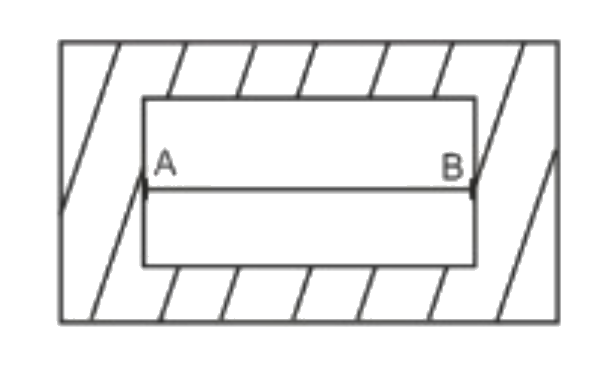Coefficient of thermal expansion of a wire varies with temperature T as α=1.6×10−6T, where T is temperature in degree Celsius. If the length of wire is 10 m at0∘C, what is the change in length of wire (in mm), when its temperature is raised to 25∘C?
The correct Answer is:5
To find the change in length of the wire when its temperature is raised from 0∘C to 25∘C, we will use the given coefficient of thermal expansion, which varies with temperature T as:
α=1.6×10−6T
Step 1: Determine the change in temperature
The initial temperature T1 is 0∘C and the final temperature T2 is 25∘C. Therefore, the change in temperature ΔT is:
ΔT=T2−T1=25∘C−0∘C=25∘C
Hint: Remember that the change in temperature is simply the final temperature minus the initial temperature.
Step 2: Set up the expression for change in length
The change in length ΔL of the wire can be expressed as:
ΔL=L0∫T2T1α(T)dT
where L0 is the initial length of the wire, which is 10m.
Hint: The integral of the coefficient of thermal expansion over the temperature range gives the total change in length.
Step 3: Substitute α(T) into the integral
Substituting the expression for α:
ΔL=L0∫250(1.6×10−6T)dT
Step 4: Evaluate the integral
Calculating the integral:
ΔL=10∫250(1.6×10−6T)dT
The integral of T is:
∫TdT=T22
Thus,
ΔL=10×1.6×10−6(T22)250
Step 5: Calculate the definite integral
Calculating the limits:
ΔL=10×1.6×10−6(2522−022)
Calculating 252:
252=625
So,
ΔL=10×1.6×10−6×6252
Calculating further:
ΔL=10×1.6×10−6×312.5=5.0×10−4m
Step 6: Convert to mm
To convert meters to millimeters, multiply by 1000:
ΔL=5.0×10−4m×1000=0.5mm
Final Answer
The change in length of the wire when its temperature is raised to 25∘C is:
ΔL=0.5mm
---
The initial temperature T1 is 0∘C and the final temperature T2 is 25∘C. Therefore, the change in temperature ΔT is:
The change in length ΔL of the wire can be expressed as:
Substituting the expression for α:
Calculating the integral:
Calculating the limits:
To convert meters to millimeters, multiply by 1000:
The change in length of the wire when its temperature is raised to 25∘C is:
Topper's Solved these Questions
Similar Questions
The coefficient of linear expansion of a rod of length 1 m, at 27∘C, is varying with temperature as α = 2/T unit (300K≤T≤600K), where T is the temperature of rod in Kelvin. The increment in the length of rod if its temperature increases from 27∘C to 327∘C is
View SolutionThe corfficient of linear expansion for a certain metal varies with temperature as α(T). If L0 is the initial elgnth of the metal and the temperature of metal is changed from T0 to T(T0>T), then
View Solution
Knowledge Check
Length of wire at room temperature is 4.55 m , when the temperature increases upto 100∘C then its length becomes 4.57 m . The coefficient of linear expansion (α) of the given wire is
A5.021×10−5K−1B6.021×10−5K−1C7.021×10−5K−1D8.021×10−5K−1
The co-efficient of thermal expansion of a rod is temperature dependent and is given by the formula α=aT, where a is a positive constant at T in∘C. if the length of the rod is l at temperature 0∘C, then the temperature at which the length will be 2l is
View SolutionA rod of length l with thermally insulated lateral surface consists of material whose heat conductivity coefficient varies with temperature as k=a/T, where a is a constant. The ends of the rod are kept at temperatures T1andT2. Find the function T(x), where x is the distance from the end whose temperature is T1.
View SolutionAn iron wire AB has diameter of 0.6 mm and length 3 m at 0∘C. The wire is now stretched between the opposite walls of a brass casing at 0∘C. What is the extra tension that will be set up in the wire when the temperature of the system is raised to 40∘C?
Givne αbrass=18×10−6/K
αiron=12×10−6/K
Yiron=21×1010N/m^(2)

View SolutionThe degree of dissociation of water in a 0.1M aqueous solution of HCl at a certain temperature t∘C is 3.6×10−15. The temperature t must be : [density of water at t∘C=1gm/mL.]
View SolutionResistance of a metal wire of length 1 m is 26Ω at 20∘C. If the diameter of the wire is 0.3mm, what will be the resistivity of the metal at that temperature ? .
View SolutionThe temperature coefficient of resistance of a wire is 0.00145∘C−1. At 100∘C its resistance is 2Ω. At what temperature the resistance of the wire be 3Ω?
View SolutionThe coefficient of linear expansion 'α' of the material of a rod of length l0 varies with absolute temperature as α=aT−bT2 where a & b are constant. The linear expansion of the rod when heated from T1 to T2=2T1 is :-
View Solution
